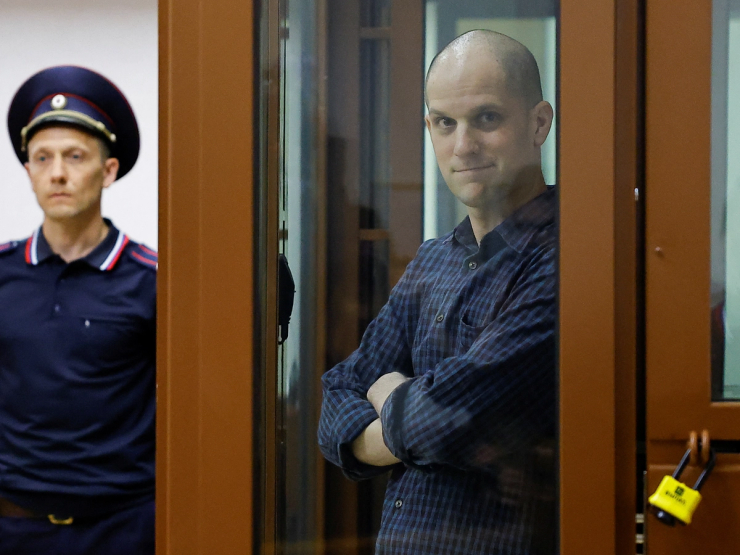The Scoop
The Wall Street Journal’s triumphant, relieved coverage of Evan Gershkovich’s release this August includes a riveting 8,000-word account of the negotiations that freed him. Like most of the Journal’s extensive coverage, the narrative begins with his arrest on March 29, 2023.
Absent is any mention of the Journal’s internal process for approving Gershkovich’s assignment, the details of its security operation, or any of the decisions that led to an ambitious young reporter’s risky trips to the heart of the Russian military-industrial complex in wartime.
Since Gershkovich was grabbed by Russian security agents at a steakhouse in Yekaterinburg, the Journal has been silent on a debate festering among its own staff and the community of journalists who cover Russia: how much a complicated if mundane management mess in Moscow and security decisions in New York may have put him at risk.
Those aren’t simple questions, and nobody doubts Russia’s sole responsibility for arresting Gershkovich and using him as a geopolitical bargaining chip. But Journal staffers who believe management made missteps are agitating for more transparency and accountability. Many in the newsroom think that, as one put it, “Evan did the right things” but editors “should never have let him do it.”
Semafor did not pursue reporting on the details of Gershkovich’s capture while he was in captivity, for fear that it could interfere with the campaign for his release. Other journalists familiar with the details said they avoided covering the issue for the same reason.
But conversations with a dozen current and former Wall Street Journal employees and with others close to the situation over the last two years reveal wide questions about why Gershkovich was sent on the dangerous assignment at a darkening time in Moscow.
In this article:
Know More
While the Journal’s own coverage of the crisis begins in the spring of 2023, the dysfunction in the publication’s Moscow bureau had been boiling below the surface for months. In June 2018, the Journal hired Ann Simmons, a Los Angeles Times reporter whose career included roles as a foreign correspondent in Johannesburg and Nairobi, and a stint in Time’s Moscow bureau in the early 1990s. In December 2018, she drew global attention — and some snickers from the insular Moscow press corps — for asking President Vladimir Putin in imperfect Russian about suggestions that he planned to “rule the world.”
For reasons that are disputed, Simmons did not always jell with her new team, though she would later speak warmly of hiring Gershkovich and of his work. By 2022, the situation had emerged as the sort of painful management problem familiar to any big company. Some on the foreign desk believed Simmons lacked the experience needed to cover Russia in wartime. As it became clearer in 2022 that war in Ukraine was likely, some top editors discussed internally whether she should be removed as bureau chief. Her defenders felt that her internal critics were unfair; Simmons, a Black woman born in London, might not have fit the Journal’s stereotype of a Russia hand, but she’d had a distinguished career.
As Russia marched toward war, the Journal’s foreign desk was busy trying to make its team get along.
One consequence of the management drama was that Gershkovich, then 31, wasn’t primarily clearing his assignments with a Russia specialist in Moscow. He was dealing with editors in London and New York. And other Journal Russia experts, like the national security reporter Alan Cullison, who had moved to Washington, were also in the dark about his plans.
Reporters in every newsroom push for dangerous, splashy stories. Editors often refuse to let them take those risks. And Gershkovich, colleagues said, followed the Journal’s careful internal procedures when he began asking questions about whether foreign companies were supplying the Russian military machine. It was the kind of story that, if true, would be a classic Journal blockbuster, roiling geopolitics and stock markets at the same time.
The Journal’s foreign editor, Gordon Fairclough, who had shared a Pulitzer in 2007 for his work in China, approved a first reporting trip, and then a second. The Journal’s security team signed off and managed the logistics. Gershkovich got legal guidance from the Journal on how to avoid crossing lines on a sensitive story. For instance, one fellow employee said, he was told not to handle sensitive documents.
Heavily edited recordings released by Russia purporting to incriminate Gershkovich appear to offer a glimpse at this legalism. In a video snippet, Gershkovich is seated beside a source, taking notes. In another shot, there is paper on the table. Gershkovich appears to discuss a document with his source and says, “Leave it at home. … This is just an interview.”
“The video has been edited to emphasize that Gershkovich appears to try to hide a piece of paper upon seeing the FSB officers, though it’s not clear from the footage what this is,” the independent Russian outlet Meduza wrote.
It’s impossible to tell fully what is going on; Dow Jones declined to comment on the authenticity of those videos or to explain the situation. Gershovich has not publicly discussed the situation and is writing a book about his experience. But even based on the video, Russian claims that Gershkovich is a spy are risible. His out-of-context words obviously cast him as a journalist.
Journal veterans who spoke to Semafor believe the Journal was naive in three ways.
First, Yekaterinburg isn’t a normal Russian city. It is the longtime heart of Russian industry and an important center of military production. An American reporter’s visit — even in peacetime — would be the rough equivalent of a Russian journalist bringing her notebook to nose around Raytheon’s Arizona missile factory or a Chinese reporter posting up in Fort Meade.
Second, some at the Journal felt that a focus on following the letter of Russian law offered little protection from the country’s security services, not least in wartime.
And finally, they felt the managers had ignored one of the so-called Moscow rules: never assume that the Russians don’t know exactly what you’re doing.
The Journal, which fought hard to keep Gershkovich’s case on top of the US government’s list of priorities and helped win his freedom in a complex set of prisoner exchanges, has quietly looked inward. The paper, one source said, retained a law firm to review its internal practices as it advocated for Gershkovich’s release, but has not shared those findings with the newsroom.
Max’s view
It bears repeating that Gershkovich’s arrest and detention was a Russian decision — part of a crackdown on independent journalism of all sorts. Many Moscow correspondents believe that Gershkovich was mostly unlucky, a target of convenience for a regime that had chosen to take a high-profile American hostage. Once he was detained, the Journal and its parent company Dow Jones expended real political capital and resources to ensure that he returned home as quickly as possible, the kind of support that any journalist would hope for from a media organization.
The Journal, meanwhile, has undergone significant changes over the last year as its new editor Emma Tucker has attempted to make the organization leaner, faster, and more eye-catching. The paper has had a series of major successes, including deeply-reported and meaningful stories about President Joe Biden’s mental acuity, billionaire Elon Musk’s businesses and relationship with Putin, and a host of major scoops. But the changes have been accompanied by massive cuts and alterations to editorial processes that have divided the organization. An unspoken wrinkle of the Gershkovich saga was that the campaign to get him home was a rare point of unity across the industry and within the Journal’s newsroom.
The Journal doesn’t appear to have relished our reporting on the background of the Gershkovich story. To be sure, managing a newsroom’s safety is a complex task, and an increasingly difficult one. Journalists — especially those covering conflicts — often run towards, not away from, danger, and sometimes the odds catch up. Few news organizations have ever made public a deep dive into their security decisions, not least because of fears of liability. But the process and climate that preceded Gershkovich’s detention is worth examining, if only to help avoid similar future situations.
Update
After this article was published, a Dow Jones spokesperson, Lauren McCabe, emailed that the article is “particularly unfair in its categorization of Ann Simmons. It is simply untrue that senior editors considered replacing Ann at the start of the war with Ukraine. Additionally, none of the four people on the foreign desk at the time believed Ann lacked the experience needed to cover Russia in wartime. It is also untrue that Ann spoke in “imperfect Russian” at a press conference in 2018, and the line ‘Simmons, a Black woman born in London, might not have the Journal’s stereotype of a Russia hand’ is especially offensive.”


